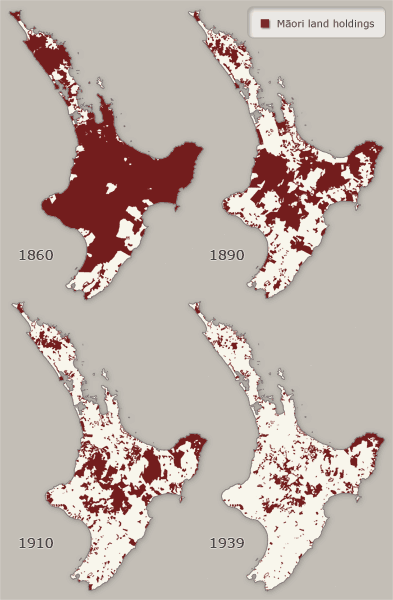

Similar to the United States and just about every other settler colony (see the US counterpart map – https://decolonialatlas.wordpress.com/2014/11/03/the-deforestation-and-colonization-of-the-united-states/ ) European settlers in Aotearoa (New Zealand) had to first remove the Māori from the land before they could begin to extract resources from it – in this case, timber. As Māori land holdings decreased since the Treaty of Waitangi in 1840, so too did the forests of Aotearoa. This may have been a contributing factor in the extinction of dozens of endemic bird species since European colonization – the introduction of predatory mammals to Aotearoa being another large factor.

[…] מהיערות שבהם חיים הילידים המאורים. אבל, בדומה לנגב, לגירוש השבטים המאורים ולבירוא היערות היו השפעות אקולוגיות […]
LikeLike
[…] İngilizler Yeni Zelanda’da koloni kurmadan önceki orman örtüsü (sol) ile bugünün (sağ)… […]
LikeLike
[…] A comparison of forest cover before the British established a colony in New Zealand (left) versus today (right). Image: Decolonial Atlas […]
LikeLike
[…] A comparison of forest cover before the British established a colony in New Zealand (left) versus today (right). Image: Decolonial Atlas […]
LikeLike
[…] A comparison of forest cover before the British established a colony in New Zealand (left) versus today (right). Image: Decolonial Atlas […]
LikeLike
[…] A comparison of forest cover before the British established a colony in New Zealand (left) versus today (right). Image: Decolonial Atlas […]
LikeLike
[…] A comparison of forest cover before the British established a colony in New Zealand (left) versus today (right). Image: Decolonial Atlas […]
LikeLike
[…] A comparison of forest cover before the British established a colony in New Zealand (left) versus today (right). Image: Decolonial Atlas […]
LikeLike
[…] A comparison of forest cover before the British established a colony in New Zealand (left) versus today (right). Image: Decolonial Atlas […]
LikeLike
[…] A comparison of forest cover before the British established a colony in New Zealand (left) versus today (right). Image: Decolonial Atlas […]
LikeLike
[…] A comparability of forest cowl earlier than the British established a colony in New Zealand (left) versus right this moment (proper). Picture: Decolonial Atlas […]
LikeLike
[…] A comparison of forest cover before the British established a colony in New Zealand (left) versus today (right). Image: Decolonial Atlas […]
LikeLike
[…] A comparison of forest cover before the British established a colony in New Zealand (left) versus today (right). Image: Decolonial Atlas […]
LikeLike
It’s interesting you don’t make mention of the forest cover prior to the arrival of any humans to New Zealand. The forest cover around 1000AD was approximately 85% of the country (essentially all excepting those areas impacted by volcanic eruptions and alpine areas.
By the time of the signing of the treaty of Waitangi, forest cover had been reduced to 53% along with the loss of all 11 species of Moa and most other flightless birds.
LikeLike
[…] (4) https://decolonialatlas.wordpress.com/2015/01/27/the-deforestation-and-colonization-of-aotearoa/ […]
LikeLike
[…] (4) https://decolonialatlas.wordpress.com/2015/01/27/the-deforestation-and-colonization-of-aotearoa/ […]
LikeLike
Reblogged this on Earth's Bloodstains.
LikeLike
Thank you for including my country here. Interestingly, it is being further stripped of its native wildlife via the widespread use of 1080 poison all over the forests (for 50+ years). Each aerial drop can kill up to 10K birds. The official narrative & this is Agenda 2030 policy (UN) is to remove all non natives by 2050 however they deny that their deadly poison is also killing natives. The native Kea is nearing extinction now. I believe this prolific poison use is in fact stripping the lands ready for mining & other exploitation. It is also destroying wild food (witness poisonings of humans now happening). If you come as a tourist be very wary of the ‘clean green’ lie that’s promoted about our wild places. It isn’t true. https://envirowatchrangitikei.wordpress.com/1080-2/
LikeLike
It is true Pam
LikeLiked by 1 person
Bring the forests back and work with nature.Not the other way around.
LikeLike